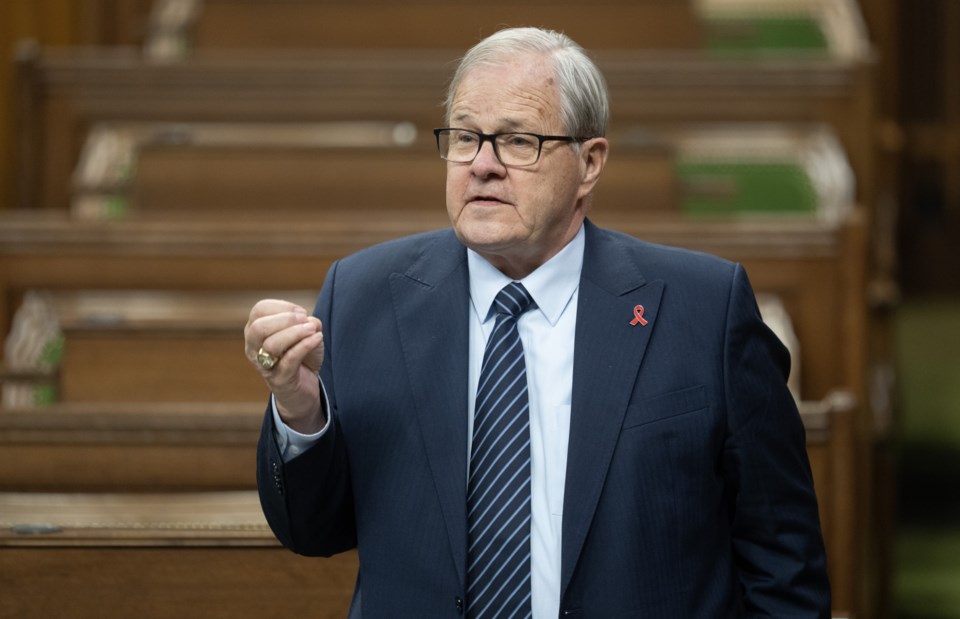Federal Agriculture Minister Lawrence MacAulay wouldn't rule out the possibility of provincial or federal government intervention if the grocery code of conduct doesn't have every major retailer on board.
In an interview, MacAulay said Thursday he will meet next week with federal Industry Minister François-Philippe Champagne and provincial ministers to discuss options for both provincial and federal governments if the major grocers don't sign the code.
"Perhaps some changes have to be made," he said.
MacAulay and Quebec Agriculture Minister André Lamontagne have expressed their disappointment to see the grocery code of conduct has still not been launched after years of work, with some "supply chain partners" hesitant to sign on.
In a statement Thursday, the ministers said the major grocers need to adopt and adhere to the code, and said in the coming days, they will be "reviewing all possible options available to us."
“Two years of evaluating the situation would seem to me to be long enough," MacAulay said. "It's time to move on. Let's get the code signed."
At a House of Commons agriculture committee meeting in Ottawa on Thursday on stabilizing food prices, members of Parliament pressed Walmart Canada CEO Gonzalo Gebara and Loblaw chairman Galen Weston on why their companies have not yet signed the code.
Bloc Québécois MP Yves Perron accused both companies of “sabotaging” the development of the code.
Gebara said his company has participated in the development of the code, but is "not in a position at this time to commit" to it.
In the current version of the code, "there's provisions that create bureaucracy and cost, cost that will inevitably end up on shelf prices," he said.
Weston said Loblaw will sign the code, but not in its current form.
In a Nov. 1 letter sent to members of both the steering committee developing the code and the industry subcommittee, Loblaw said it's worried the code could "raise food prices for Canadians by more than $1 billion," a figure Weston stood by on Thursday.
Weston told MPs on Thursday he’s concerned the code will give too much power in negotiations to large multinational manufacturers. Many manufacturers, he said, are already “signalling or submitting higher than expected cost increases for next year.”
"We were able to push back on 18 per cent of what we believed ... to be unjustified cost increases across the industry last year. Based on the way the code is drafted today, we will be severely restricted in terms of our ability to do that."
Michael Graydon, CEO of the Food, Health & Consumer Products of Canada association and chairman of the interim board of directors of the grocery code of conduct, said Thursday that the code is "fundamentally done."
He praised the statement from the ministers, calling it "much overdue."
Graydon said the working group responded to Loblaw with what he believes are "very strong responses as to why the provisions they want changed fundamentally can't be changed."
He said Loblaw's requested changes "would fundamentally neuter the code's ability" to improve how business is done in the grocery industry.
"They want to continue to have unilateral decision power. Well, that is fundamentally why we need a code."
Graydon, who was co-chair of the steering committee developing the code, said it's not yet clear whether Loblaw, Walmart or Costco will sign the code.
Costco did not respond to a request for comment.
Gary Sands, a member of the interim board and senior vice-president at the Canadian Federation of Independent Grocers, said the ministers' statement was a "good first step."
"I think it sends a clear message to everyone that there's an expectation on the part of governments that they want the entire industry to support this code," he said.
The grocers have also been under pressure from Ottawa to provide plans to stabilize food prices at their stores. The government summoned the heads of Loblaw, Metro, Empire, Walmart Canada and Costco to present their plans earlier this fall.
Weston told MPs that that meeting with Champagne resulted in “materially lower prices” for 35 often-purchased items and categories, like milk, butter, eggs and chicken.
“We're delivering these savings through the pricing and promotional programs that customers understand and respond best to. They are making a difference,” he said.
Gebara said through periods of high inflation, Walmart continues to hold or lower prices where possible, sometimes absorbing or pushing back on cost increases from suppliers. He said the grocer has launched several programs that resulted in lower prices, such as offering Thanksgiving meals at lower prices than last year.
On Monday, Empire Co. Ltd. CEO Michael Medline said his company, which owns Sobeys, has expanded its annual November-to-January price freeze.
"We also have meaningful plans and development to help stabilize food prices past January, but will not discuss these publicly as they remained commercially and competitively sensitive until launched in our stores," Medline told the agriculture committee.
— With files from Nojoud Al Mallees in Ottawa.
This report by The Canadian Press was first published Dec. 7, 2023.
Companies in this story: (TSX:L, TSX:EMP.A,TSX:MRU)
Rosa Saba, The Canadian Press



